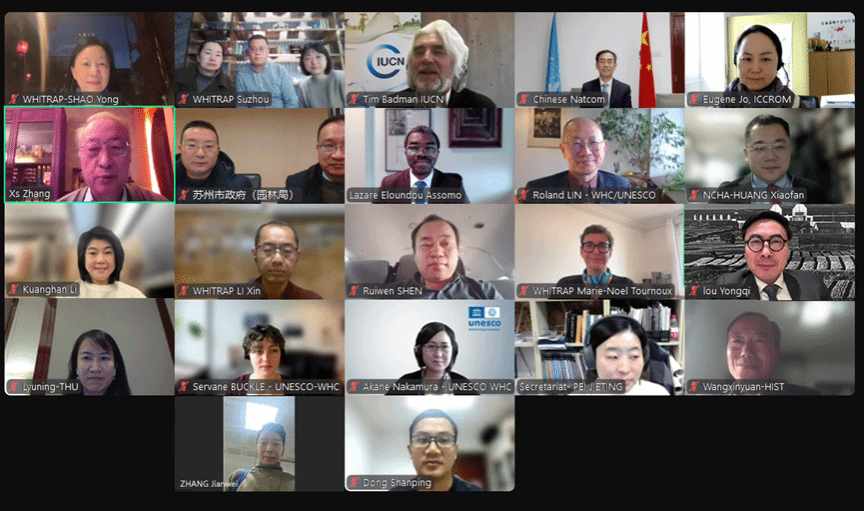2025年1月16日,联合国教科文组织亚太地区世界遗产培训与研究中心(以下简称“中心”)2024年度理事会会议在线上举行,与会代表共同审议了中心2020至2024年的工作成果及2025至2026中心工作计划,并重点讨论了中心未来发展战略,为中心未来发展和合作网络建设提供了有力的指导,推动亚太地区世界遗产保护事业的发展。

理事会参会嘉宾合影
开幕致辞
本次会议由中心理事会主席、原教育部副部长章新胜主持,理事会成员单位代表联合国教科文组织世界遗产中心主任拉扎赫·伊伦都·阿索莫、中国教科文组织全国委员会秦昌威秘书长、国家文物局世界遗产处处长黄晓帆和国家林草局代表董山平、同济大学副校长娄永琪、苏州市人民政府代表钱宇澄、清华大学吕舟教授的代表吕宁副教授、联合国教科文组织国际自然与文化空间技术中心副主任王心源、我中心秘书长邵甬教授等,以及来自世界遗产中心、中心秘书处、北京分中心、上海分中心、苏州分中心等的代表出席会议。国际自然保护联盟(IUCN)、国际文化遗产保护与修复研究中心(ICCROM)等国际组织代表也应邀参会。此次会议汇聚了多方智慧与力量,旨在共同探讨中心未来的发展路径,共同推动亚太地区世界遗产保护交流与合作。
章新胜主席在开幕致辞中回顾了亚太遗产中心自2008年成立以来的发展历程,特别强调了过去五年间,在中国政府与联合国教科文组织的支持下,中心通过能力建设、研究实践以及国际合作等形式,在推动《世界遗产公约》在亚太地区落实方面取得的显著成就。他指出,2025年将迎来新一轮六年评估,中心已正式启动续约程序,要为此次做好了充分准备。章主席特别强调,要保持中心的长期稳定性和连续性,继承以往的优点,如中心已经建立的国际合作网络等,同时要加强创新与拓展。三个分中心要各展其长,分工发挥各自的优势从而形成合力。此外,各二类中心也是一个整体,要建立有关二类中心定期合作与交流机制,在更大范围形成合力。
联合国教科文组织世界遗产中心主任拉扎赫·伊伦都·阿索莫在开幕致辞中高度评价了亚太遗产中心在能力建设、研究实践、国际交流等方面所做出的努力。他重申了联合国教科文组织对中心未来工作的坚定支持,期待中心能够在新的六年间继续引领区域内的遗产保护工作,为全球遗产保护事业贡献更多智慧与力量。
随后,中心秘书长邵甬教授详细汇报了中心2020至2024年的工作成果。北京分中心执行主任李光涵和苏州分中心主任顾文华分别介绍了各自分中心的最新发展情况及未来计划。与会代表围绕中心工作报告和工作计划进行了深入讨论,并提出了建设性意见和建议。
会议成果
中心工作得到与会代表的高度认可,世界自然保护联盟世界遗产项目部负责人蒂姆·巴德曼表示:中心是一个十分健康并有巨大潜力的二类机构。
秦昌威秘书长对中心未来工作提出进一步要求:一是做好工作总结和国际评估的准备;二是调整工作模式以适应新的需求;三是加强与联合国教科文组织、专业评估机构、会员国及国内相关部门的合作;四是增强研究力量,汇聚北京大学与同济大学和苏州的优势资源,开展协同研究;五是完善三个中心协同运行的新机制,形成合力应对新的任务和挑战。
会议还通过了多项决议,包括迎接中期评估的准备工作、加强与联合国教科文组织及成员国的合作、提升研究能力建设与工具开发等。会议强调,中心将继续深化与国际组织、政府机构及各合作伙伴之间的合作关系,扩大能力建设努力,推进全球遗产保护议程。
此次理事会会议的成功召开,为中心未来的发展指明了方向。在各方的共同努力下,亚太遗产中心将继续为亚太地区乃至全球的世界遗产保护事业贡献力量,推动文化遗产与自然遗产的可持续发展。

News | WHITR-AP Concludes 2024 Governing Board Meeting
On January 16, 2025, WHITR-AP (the Institute) convened its 2024 Governing Board Meeting online, bringing together representatives and experts to reflect on achievements from 2020–2024 and set a strategic direction for the future. The meeting marked a significant milestone in the Institute’s efforts to advance World Heritage conservation in the Asia-Pacific region.

Group photo of 2024 Governing Board Meeting
Opening Remarks The meeting was chaired by Zhang Xinsheng, Chair of the Governing Board, and attended by Lazare Eloundou Assomo, Director of the UNESCO World Heritage Centre; Qin Changwei, Secretary-General of the Chinese National Commission for UNESCO; and representatives from key Chinese authorities, including the National Cultural Heritage Administration, the National Forestry and Grassland Administration, and three hosting institutions including Peking University, Tongji University and Suzhou Municipal government. Observers from the International Union for Conservation of Nature (IUCN) and the International Centre for the Study of the Preservation and Restoration of Cultural Property (ICCROM) also participated, contributing global perspectives to the discussions.
In his opening remarks, Chair Zhang reviewed the Institute’s achievements over the past five years, emphasizing its contributions to implementing the Convention through capacity building, research, and international partnerships. He highlighted the institute’s preparations for the upcoming external evaluation on WHITR-AP in 2025, signaling its commitment to ongoing excellence. Chair Zhang also highlighted the strong and healthy collaboration within WHITR-AP and the unity among the three sub-centres. Dr. Lazare Eloundou Assomo commended WHITR-AP for its capacity-building initiatives and leadership in fostering international cooperation, reaffirming UNESCO’s strong support for its future endeavors.
Shao Yong, Secretary-General of WHITR-AP, presented a detailed report on the institute’s accomplishments from 2020 to 2024, while directors of the Beijing and Suzhou sub-centers provided updates on their respective programs and future plans. Participants engaged in productive discussions on the Institute’s strategic plans, resulting in several key resolutions including: enhancing preparations for the external evaluation; strengthening collaborations with UNESCO, member states, and international partners; expanding research and capacity-building efforts to address evolving heritage conservation challenges.
Key OutcomesWHITR-AP’s work and future initiatives was recognized by the participants. Tim Badman, from IUCN shared his reflections and suggestions following the presentations. He praised the work of WHITR-AP and its sub-centres, acknowledging their healthy state and growth potential.
Qin Changwei, Secretary-General of the Chinese National Commission for UNESCO, made several key suggestions: 1) Complete a thorough work review and prepare for the upcoming evaluation; 2) Adjust the institute's work model to meet evolving demands; 3) Strengthen cooperation with UNESCO, professional evaluators, member countries, and relevant domestic departments; 4) Enhance research capabilities by leveraging the strengths of Peking University, Tongji University, and Suzhou to conduct collaborative research; and 5) Improve the operational mechanism for collaboration among the three sub-centres, ensuring coordinated action in response to new challenges.
The meeting concluded with a renewed commitment to advancing World Heritage conservation in the Asia-Pacific region. By fostering deeper collaboration with global and regional partners, the Institute aims to drive sustainable development and innovation in cultural and natural heritage preservation.
The 2024 Governing Board Meeting set a strong foundation for WHITR-AP’s continued contribution to global heritage conservation, reinforcing its role as a vital platform for capacity building, research, and international exchange.

